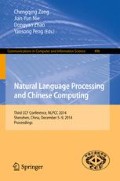Abstract
Keyword extraction of scientific articles is beneficial for retrieving scientific articles of a certain topic and grasping the trend of academic development. For the task of keyword extraction for Chinese scientific articles, we adopt the framework of selecting keyword candidates by Document Frequency Accessor Variety(DF-AV) and running TextRank algorithm on a phrase network. To improve domain adaption of keyword extraction, we introduce known keywords of a certain domain as domain knowledge into this framework. Experimental results show that domain knowledge can improve performance of keyword extraction generally.
Access this chapter
Tax calculation will be finalised at checkout
Purchases are for personal use only
Preview
Unable to display preview. Download preview PDF.
References
Kim, S.N., Medelyan, O., Kan, M.Y., Baldwin, T.: Semeval-2010 task 5: Automatic keyphrase extraction from scientific articles. In: Proceedings of the 5th International Workshop on Semantic Evaluation, pp. 21–26. Association for Computational Linguistics (2010)
Frank, E., Paynter, G.W., Witten, I.H., Gutwin, C., Nevill-Manning, C.G.: Domain-specific keyphrase extraction (1999)
Tomokiyo, T., Hurst, M.: A language model approach to keyphrase extraction. In: Proceedings of the ACL 2003 Workshop on Multiword Expressions: Analysis, Acquisition and Treatment, vol. 18, pp. 33–40. Association for Computational Linguistics (2003)
Paukkeri, M.S., Nieminen, I.T., Pöllä, M., Honkela, T.: A language-independent approach to keyphrase extraction and evaluation. In: COLING (Posters), pp. 83–86 (2008)
Barker, K., Cornacchia, N.: Using noun phrase heads to extract document keyphrases. In: Hamilton, H.J. (ed.) Canadian AI 2000. LNCS (LNAI), vol. 1822, pp. 40–52. Springer, Heidelberg (2000)
Nguyen, T.D., Kan, M.-Y.: Keyphrase extraction in scientific publications. In: Goh, D.H.-L., Cao, T.H., Sølvberg, I.T., Rasmussen, E. (eds.) ICADL 2007. LNCS, vol. 4822, pp. 317–326. Springer, Heidelberg (2007)
Hulth, A.: Improved automatic keyword extraction given more linguistic knowledge. In: Proceedings of the 2003 Conference on Empirical Methods in Natural Language Processing, pp. 216–223. Association for Computational Linguistics (2003)
Hulth, A.: Combining machine learning and natural language processing for automatic keyword extraction. Department of Computer and Systems Sciences (Institutionen för Data-och systemvetenskap), Univ. (2004)
Witten, I.H., Paynter, G.W., Frank, E., Gutwin, C., Nevill-Manning, C.G.: Kea: Practical automatic keyphrase extraction. In: Proceedings of the Fourth ACM Conference on Digital Libraries, pp. 254–255. ACM (1999)
Liu, F., Pennell, D., Liu, F., Liu, Y.: Unsupervised approaches for automatic keyword extraction using meeting transcripts. In: Proceedings of human language technologies: The 2009 Annual Conference of the North American Chapter of the Association for Computational Linguistics, pp. 620–628. Association for Computational Linguistics (2009)
Matsuo, Y., Ishizuka, M.: Keyword extraction from a single document using word co-occurrence statistical information. International Journal on Artificial Intelligence Tools 13(01), 157–169 (2004)
Ercan, G.: Automated text summarization and keyphrase extraction. PhD thesis, bilkent university (2006)
Liu, Z., Li, P., Zheng, Y., Sun, M.: Clustering to find exemplar terms for keyphrase extraction. In: Proceedings of the 2009 Conference on Empirical Methods in Natural Language Processing, vol. 1, pp. 257–266. Association for Computational Linguistics (2009)
Krapivin, M., Autayeu, M., Marchese, M., Blanzieri, E., Segata, N.: Improving machine learning approaches for keyphrases extraction from scientific documents with natural language knowledge. In: Proceedings of the Joint JCDL/ICADL International Digital Libraries Conference, pp. 102–111 (2010)
Zhang, C.: Automatic keyword extraction from documents using conditional random fields. Journal of Computational Information Systems 4(3), 1169–1180 (2008)
Kim, S.N., Medelyan, O., Kan, M.Y., Baldwin, T.: Automatic keyphrase extraction from scientific articles. Language Resources and Evaluation 47(3), 723–742 (2013)
Lopez, P., Romary, L.: Humb: Automatic key term extraction from scientific articles in grobid. In: Proceedings of the 5th International Workshop on Semantic Evaluation, pp. 248–251. Association for Computational Linguistics (2010)
Mihalcea, R., Tarau, P.: Textrank: Bringing order into texts. Association for Computational Linguistics (2004)
Wan, X., Xiao, J.: Collabrank: Towards a collaborative approach to single-document keyphrase extraction. In: Proceedings of the 22nd International Conference on Computational Linguistics, vol. 1, pp. 969–976. Association for Computational Linguistics (2008)
Liu, Z., Huang, W., Zheng, Y., Sun, M.: Automatic keyphrase extraction via topic decomposition. In: Proceedings of the 2010 Conference on Empirical Methods in Natural Language Processing, pp. 366–376. Association for Computational Linguistics (2010)
Feng, H., Chen, K., Deng, X., Zheng, W.: Accessor variety criteria for chinese word extraction. Computational Linguistics 30(1), 75–93 (2004)
Page, L., Brin, S., Motwani, R., Winograd, T.: The pagerank citation ranking: Bringing order to the web (1999)
Hulth, A., Karlgren, J., Jonsson, A., Boström, H., Asker, L.: Automatic keyword extraction using domain knowledge. In: Gelbukh, A. (ed.) CICLing 2001. LNCS, vol. 2004, pp. 472–482. Springer, Heidelberg (2001)
Coursey, K.H., Mihalcea, R., Moen, W.E.: Automatic keyword extraction for learning object repositories. Proceedings of the American Society for Information Science and Technology 45(1), 1–10 (2008)
Zhang, Y., Clark, S.: Syntactic processing using the generalized perceptron and beam search. Computational Linguistics 37(1), 105–151 (2011)
Author information
Authors and Affiliations
Editor information
Editors and Affiliations
Rights and permissions
Copyright information
© 2014 Springer-Verlag Berlin Heidelberg
About this paper
Cite this paper
Li, G., Wang, H. (2014). Improved Automatic Keyword Extraction Based on TextRank Using Domain Knowledge. In: Zong, C., Nie, JY., Zhao, D., Feng, Y. (eds) Natural Language Processing and Chinese Computing. NLPCC 2014. Communications in Computer and Information Science, vol 496. Springer, Berlin, Heidelberg. https://doi.org/10.1007/978-3-662-45924-9_36
Download citation
DOI: https://doi.org/10.1007/978-3-662-45924-9_36
Publisher Name: Springer, Berlin, Heidelberg
Print ISBN: 978-3-662-45923-2
Online ISBN: 978-3-662-45924-9
eBook Packages: Computer ScienceComputer Science (R0)

